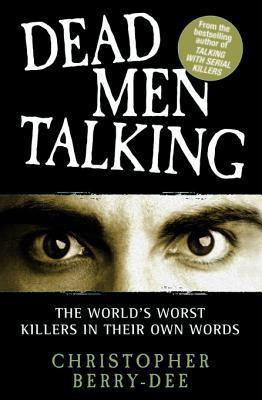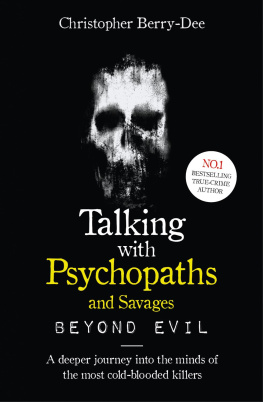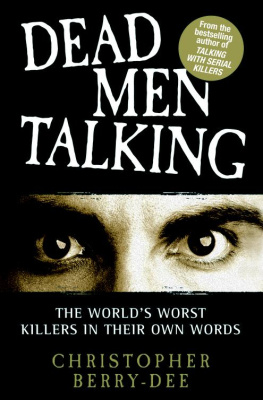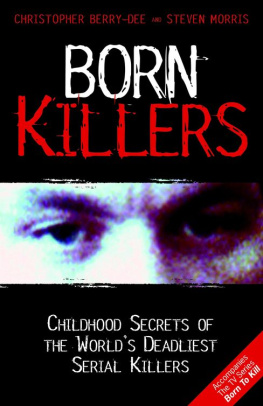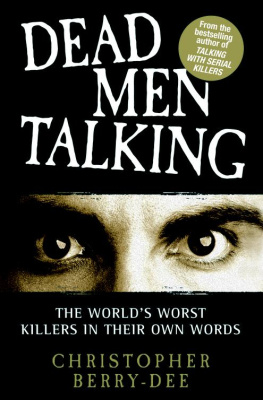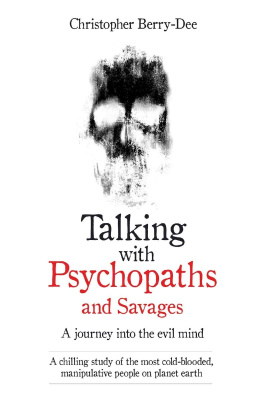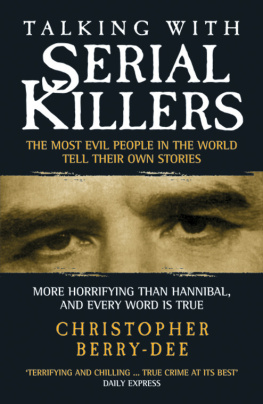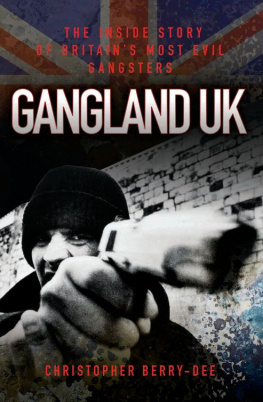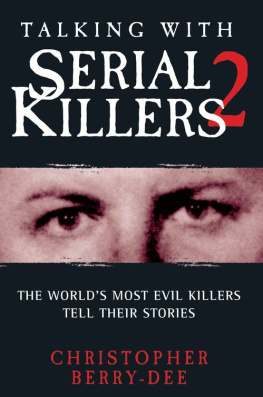Dead Men Talking Christopher Berry-DeeJohn Blake (2011)
Six unforgettable prisoners tell their stories, giving the details and background of their terrifying casesa must-read for anyone fascinated by the extremes of the human condition
Renowned crime expert Christopher Berry-Dee has gained the trust of some of the most infamous inmates from around the world, having corresponded with them and even entered their prison lairs to discuss their horrific crimes in detail. Subjects include John Edward Robinson, convicted in 2003 of the murders of several women in Kansas; "Ice Queen" Melanie McGuire of New Jersey, convicted in 2007 of the murder and dismemberment of her husband; Phillip Carl Jablonski, convicted of killing five women in California and Utah between 1978 and 1991; 94-year-old Viva Leroy Nash, serving two consecutive life sentences in Utah for murder and robbery; Michael Bruce Ross, executed in 2005 by the state of Connecticut, and "The Happy Face Killer" Keith Hunter Jesperson, serving three consecutive...

This book is dedicated my late mother, Mary Dee
W riting non-fiction is not possible without a collective effort by many people and the study of violent crime on a first-hand basis can be at once rewarding, exciting and distressing; conversely, it also has its lighter moments. But at the end of the road, the time comes to reflect on that journey and to remember all those individuals and organisations who, in their various capacities, helped to make the realisation of a book possible and, hopefully, worthwhile. Now is this time.
First and foremost, I am indebted to my countless readers from around the world. I receive dozens of letters and emails every month from you guys thanking me for my books and how you appreciate the work that I do. Often you are students, studying criminal justice; sometimes police officers, who take on board my no-nonsense approach, at the same time appreciating my black humour when the mood takes me. From whatever walk of life you hail from, you should not thank me, for I thank you all . Without you the support would be gone and I would not have the reason, nor the means, to pen another word. An authors public is an authors lifeblood and as we enter the most difficult of financial times, I sincerely appreciate your contribution towards understanding the most evil and twisted minds living within our societies: the serial killers.
Secondly, to my very close friend and publisher, John Blake. John has been supporting me since 2001 and a more generous and fine fellow one could not wish to meet. Also to Johns entire team at John Blake Publishing Limited, who have worked tirelessly on all of my publishing projects, to include my commissioning editor, Lucian Randall, John Wordsworth (who wishes to remain nameless), Rosie Ries, Michelle Signore and Joanna Kennedy.
On the bookstore front, thanks to the countless bookstores whether they be in the UK, USA or otherwise for promoting and selling my books, especially to Alison Darby at Waterstones. Also a big thank you to the media, from both sides of the pond, for promoting my work where possible.
Although this may seem inappropriate to many readers, I am obliged to thank the principal contributors to this book: LeRoy Nash (the old rascal that he is), Keith Hunter Jesperson, and the other killers featured throughout these pages. They all contributed to the book for their own, oft-times perverse reasons, and without their input the book would have been impossible to write. Oh, I must not forget JR Robinson, who thanks me for exposing him, I dont think. I am also most grateful to Keith Jespersons daughter, Melissa a remarkable woman.
Good can come from bad, and my relationship, built up with Mr Jesperson over months and months, has, and will continue to bear fruit in the understanding of how a serial murderers mind ticks. If he had been executed, which he probably should have been, we would have been denied his knowledge. His writings and thoughts I have passed onto the FBIs Behavioural Science Unit, for further study. They are very grateful.
With the hard core acknowledgments come thanks to very special people.
Unequivocally, and without reservation, the frontrunner has to be Kirstie Kiwi McCallum. Kiwi has selflessly supported me in this writing of this book through very troubled times because even popular writers feel the pinch sometimes and it is true to say that no stronger friend can be found.
Then there my friends, The Oddball Club, driving me to distraction when a veritable party of serial killers could not: I thank Richard, Craig and Mr Lee; also to Wilf for his devoted friendship and his thoughts on a new world order; Martin The Shrink Balaam, who will one day get weaving and write a book; also to Lizzie, Jim, Dan, Laura, Blake and Tom Stoddard.
Years back my mentor was Robin Odell, one of the finest true crime writers and crime historians of our decade. Under his guidance I was taught the trade, so to speak. God bless you Robin.
Then there is Tony, Joyce and Russell Mercier. I have known them since time began. How can one repay a couple who epitomises such selfless kinship for their fellows, who give the world a son whom they must be so proud of? Hey, Tony! You are the man; your oil paintings are class (with an A); and thank you, all three, for being you .
Finally, there is a very, very special debt of gratitude to young Ben Burton, for being himself, and for the Green Light Lady a should-be-shareholder in Aldo, who, like John Wordsworth, must also remain incognito.
And thats it. Period, as our American friends will say, leaving these Acknowledgments with you desperate to get on with reading what follows - and no nightmares, please!
Christopher Berry-Dee
2009
CONTENTS
I have interviewed, face to face, some 30 of the worlds most heinous serial killers, spree killers and mass murderers. I have sat with them on death rows throughout the United States, where the stench of cheap disinfectant, human sweat and evil permeates every brick of these correctional cathedrals, the human warehouses that incarcerate those from the legion of the damned.
I have listened to their sickening tales of murder most foul and their boasts of having caused such suffering, which are often beyond the comprehension of normal souls like you and me.
These sexual psychopaths love to play mind games and often are as cunning as hyenas. They are control freaks who attempt to manipulate even a seasoned criminologist like me, prompting the chilling question: what chance did their vulnerable prey have against such twisted characters, who can appear as innocent as the man or woman next door?
With a new millennium, a new generation of monsters has emerged. Long gone are the likes of Ted Bundy, although his story remains morbidly fascinating. Indeed, books are still being written, and TV documentaries are still produced which dredge up the oldies of yesteryear. It seems that not a month goes by without another screening of a programme on Bundy, Arthur Shawcross, Ken Bianchi or Aileen Wuornos. And Ronald DeFeo, a.k.a. The Amityville Horror, is still hot property despite the fact that in the big league of mass-murderers he is relatively small potatoes (this continued interest is mainly due to the horror films based very loosely on his case).
This book delves deep into the dysfunctional minds of some of these social outcasts. This time the gloves are off and I have allowed these monsters to say just what they wanted to and in doing so, they give away more than they intended. In that respect, this book is what newspapers might call a worldwide exclusive.
Over the years, the interviews I have conducted have always been a play off between the two parties me and the killer in question. The killers do their best to control you and this is frequently on-the-edge-of-the-abyss time. You are so close to them, breathing in the foul air they expel from their often diseased lungs. And, although it may not be quite as direct, the same can be said of spending hundreds of hours corresponding with them. In fact, I have come to the conclusion that, more often than not, what these murderers write in their correspondence is more important to understanding their psychopathology than what they say in the relatively brief face-to-face interviews. In these interviews, you must remember, the killer is on his own ground, you are there at his behest and it is in surroundings that he or she is familiar with.
Next page
